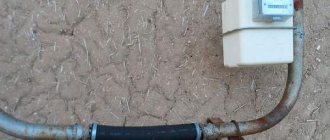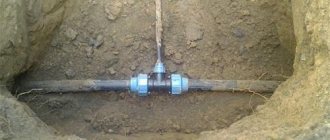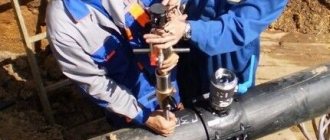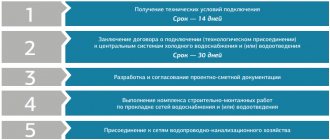Home/Water supply and sanitation/Unauthorized connection of water supply
Attention
Unauthorized connection to water supply networks is illegal use of water resources. This is not only an offense, but can provoke unforeseen and dangerous consequences, including serious breakdowns in the water supply system. Unfortunately, many unscrupulous users are not stopped by possible punishment, so every year the number of cases of illegal use of water supply is steadily growing.
When is a connection to a water supply system considered unauthorized?
In the legal environment, unauthorized connection to the water supply network means unauthorized access of a person to a resource without concluding an agreement with the water supplier or in case of identified violations of the technical regulations for this work. Legal connection is carried out only after concluding an agreement with the water utility and obtaining permission to transport water.
It is a violation to use the water supply network without installing metering devices or meters. Devices are needed in order to track actual water consumption, and their absence makes this task impossible for regulatory authorities. According to current legislation, a subscriber is a person who owns water supply facilities connected to the water supply system under an agreement with Vodokanal.
Normative base
The procedure for connecting to the water supply system is regulated by a number of regulations. Thus, the procedure for this procedure is established by Decree of the Government of the Russian Federation No. 167 “Rules for the use of public water supply and sewerage systems in Russia.” Next comes Resolution of the PRF No. 354 “Rules for the provision of utility services to owners and users of premises in apartment buildings and residential buildings.” According to the above documents, unauthorized insertion of pipes without drawing up an agreement with the water supply company is considered illegal. Based on these rules, the utility company can file a claim against the violator.
In Art. 20 Federal Law No. 416 “On Water Supply and Sanitation” identifies objects that must be accounted for. These include quantities:
- water transported to the user over a certain time according to water supply conditions;
- water received by the person operating the water supply section;
- wastewater received from the subscriber and transported by specialized organizations.
Administrative punishment for unauthorized connection of water supply is established by Article 7.20 of the Code of Administrative Offenses of the Russian Federation “Unauthorized connection to centralized water supply and sanitation systems.” Its legal basis is based on Decree of the Russian Federation No. 167 of 02.12.99 and a number of other regulatory documents. Monitoring compliance with the rules for the consumption of water resources is carried out by officials representing the bodies responsible for water supply facilities, as well as the police (Articles 23.23 and 28.3 of the Code of Administrative Offenses of the Russian Federation)
Where to go to connect in accordance with the law
To connect to water supply and sewerage systems, you should contact the nearest water utility. If you live in an apartment building and you don’t have water, you can contact your management company.
It is impossible to live without hot and cold water, but stealing it is bad, and you cannot use it for free in Russia. Unauthorized connection to water supply systems causes serious damage not only to the company that supplies the water, but also to the people who pay for it in good faith.
In addition, such interference can cause a breakdown of the entire supply system. And if the case of illegal tapping goes to court, then you can even end up with large sums, and this is not counting the administrative fine.
Therefore, it is better not to do this, to eliminate violations, if any, or to legalize the connection, and it is best to immediately do everything in accordance with the provisions of the law.
Rules for connecting to water supply
Since the water supply is under the control of the utility service, connecting new subscribers is the responsibility of these specialists. Independent connection is also possible, but only after prior approval of this issue with the communal farm. Then the tie-in procedure will be carried out by utilities.
The installation of a water pipeline occurs in three stages:
- conclusion of an agreement with the water and utility sector;
- laying a pipeline;
- connection to the main line in accordance with legal requirements.
IMPORTANT
Water supply elements must be connected to the main in a certain way using specialized equipment. Only employees of the water supply organization are allowed to work; meters are required to be installed, and scheduled technical inspections of water supply equipment are carried out.
The subscriber is prohibited from:
- use unqualified services when installing water pipes;
- connect to the system devices that are not provided for by the rules of the connection procedure;
- interfere with the operation of meters and other control and measuring instruments;
- drain water from heating equipment.
Legal basis for connecting to water supply
The process of connecting to the water supply system is regulated through several legal acts.
These standards include:
- Government Decree No. 167 of 1999 “On approval of the Rules of Use...”;
- Government Decree No. 354 of 2011 “On approval of the Rules for the provision...”.
These acts make tapping into a pipeline without drawing up an agreement illegal. Referring to such norms, a citizen can file a claim with the judicial authorities.
Federal Law No. 416 of 2011 “On Water Supply and Sanitation” reflects objects that must be taken into account.
Important! Also the provisions of Art. 7.20 of the Code of Administrative Offenses of the Russian Federation provides for penalties for unauthorized connection to water supply networks.
Rules for connecting to the water supply system
The utility service performs control functions over water pipelines. For this reason, network connection is within the competence of the employees of this body.
You can become a subscriber yourself only with prior approval from public utility organizations.
The following stages of insertion into the pipeline are distinguished:
- drawing up an agreement with the water utility;
- pipeline installation;
- connection to the main line in accordance with legal requirements.
Special equipment is used to connect the water supply and the main line. Work can only be performed by employees of the organization supplying the resource.
Responsibility for illegal connection
Prohibitions are established for consumers of utility services.
They are as follows:
- do not use unqualified services when installing water pipes;
- a ban on connecting devices to centralized systems that are not provided for by the connection rules;
- do not influence the activities of the counter;
- impossibility of draining water from the heating supply.
If these rules are violated, penalties . For an organization the amount is 20,000–30,000 rubles, for an official – 2000–3000 rubles. Citizens and individual entrepreneurs will have to pay from 1000 to 1500 rubles.
During the inspection, the authorized organization must draw up an act of unauthorized connection to the central water supply system. This document serves as the basis for bringing to administrative responsibility.
Please note: in addition to fines, criminal penalties may apply. It is enshrined in the provisions of Art. 165 of the Criminal Code of the Russian Federation.
Punishment for unauthorized connection of water supply
Unauthorized connection of water supply is the reason for the application of penalties:
- for organizations – from 20 to 30 thousand rubles;
- for officials - 2-3 thousand rubles;
- for citizens and individual entrepreneurs – 1-1.5 thousand rubles.
Representatives of the water supply and communal services draw up a report indicating the violations identified during inspections, information about the violator and the service provider. Based on this document, the person is brought to administrative responsibility.
Attention
If the fact of long-term illegal use of water has been revealed, the violator faces a fine, which is calculated using the formula S = P*D*V , where P is the maximum pipe diameter, m3; D – days in the past six months; V is the cost of m3 of water. The result is multiplied by the number of days the water was consumed illegally. Its value can be much larger than the monthly payments for water use.
In addition to fines for unauthorized connection of water supply, the offender may be subject to criminal liability regulated by Article 165 of the Criminal Code of the Russian Federation. Then the person faces imprisonment, since such a crime is regarded as theft of property.
In any case, if an illegal tap is discovered, it will be dismantled and the facility will be left without water supply.
When a connection is considered a violation
According to the official Rules for the provision of public utilities, approved by decree of the Government of the Russian Federation in 2021, a violator of the law is one who has not agreed on the water supply connection with the water and communal services authorities.
According to the Code of Administrative Offenses of Russia, liability for illegal tapping into a municipal water supply can be borne by a private individual or an entrepreneur who owns a facility with unauthorized water supply from a common pipeline and manages such a house.
It is prohibited to unauthorizedly change the design of network highways, make illegal connections even in your own house or apartment, or change the indicators of metering devices.
Responsibility will also be borne by a person who uses sewerage without appropriate metering devices. Since in this case it is difficult to determine how much water he used for free, the fine is calculated based on the maximum consumption indicators multiplied by the number of days from the moment of unauthorized tapping.
Illegal connection of water supply to a well
Private residences are most often connected to wells. This is not only cheap, but also allows you to use communications autonomously, since the water source is non-centralized. However, underground sources are minerals and fall under the requirements of Federal Law of the Russian Federation No. 2395-1 “On Subsoil”, which states that in order to use subsoil one must obtain a license. This applies in particular to entrepreneurs.
IMPORTANT
Since an artesian well contains a lot of fresh water, such a source is strategic. Article 19 of the Federal Law of the Russian Federation No. 2395-1 determines the possibility of using water reserves from a well without a license only those that are not listed on the state balance sheet, and the amount of pumped water is no more than 100 m3 per day. In addition, aquifers should not belong to the centralized water supply system. Any commercial activities in relation to water are prohibited and require a license: the resource can only be used for personal needs.
Unauthorized connection of a water supply to an ownerless well
Accounting for abandoned objects involves certain difficulties for governing bodies. Duties and responsibilities for maintaining a water supply system without an owner are transferred to municipal institutions that maintain such facilities at the expense of budgetary funds.
According to Article 8 of the Federal Law of the Russian Federation No. 416, the RSO is responsible for the operation of identified abandoned wells after approval of the act of transferring the object into the ownership of the water and wastewater services sector. Consequently, connection to a registered well is carried out in the same way as the procedure for connecting to a centralized water supply network - after concluding a contract and carrying out engineering work on the water supply section.
Additional accrual
This situation is regulated by paragraph 62 of the Resolution of the PRF No. 354. Additional charges for the operation of the water supply network are made based on the results of calculating the volume of water resources used. If it is impossible to determine this indicator, additional charges are made based on the water consumption standard, the value of which will be adjusted by a special coefficient equal to 10. Then, the volume of consumed services is calculated taking into account the number of owners of the premises.
Before making additional charges for unauthorized connection to utility systems, it is necessary to establish the fact of unauthorized access to resources. To do this, service employees check:
- serviceability and performance of meters;
- the presence of seals and other instruments that record illegal interference in the operation of equipment;
- absence of vulnerabilities in connections between devices for monitoring and accounting of consumed services.
How to legalize an illegal connection?
To avoid problems and pay large fines, you can contact utility services and agree with them on the issue of legalizing the current connection. The authorized bodies agree if they are interested in a peaceful resolution of the issue.
If a person has maliciously violated the law, utility workers are unlikely to cooperate. It’s another matter if the owner of the house did not know about the connection (for example, he purchased the property in violation). To legalize the connection, the interested person submits an application. The applicant is the owner of the storage unit where the illegal connection takes place. Utility workers assess the situation and decide whether it is possible to resolve the problem peacefully.
Possible consequences of unauthorized connection to the water supply system
Illegal connection to the water main not only causes material damage to the service responsible for the water supply, but also poses a danger to violators and their neighbors. Illegal tapping worsens the quality of drinking water, leads to contamination of pipelines and causes the development of dangerous microorganisms in the water, such as E. coli and so on.
For your information
Another common situation that arises during unauthorized tapping is serious technical violations in the water supply system. So, there may be a decrease in water pressure or, on the contrary, an increase in its supply pressure. If the water supply is laid incorrectly, the pipes freeze in winter, which also leads to serious damage to the system. Therefore, it is so important to connect and maintain the water supply through specialized services.
How to connect water correctly?
To legally connect a water supply, a potential subscriber must take the following steps:
- Obtain confirmation from local authorities. It is issued if a person has a conclusion from the water supply and communal services on the possibility of connecting to the water supply.
- Technical conditions for connection to the water supply system (provided by the region's water and utility services).
To connect, the customer submits an application addressed to the head of the company (two copies) and attaches a package of papers:
- 7 copies of the situation plan.
- Papers certifying the authority of the manager.
- Documentation confirming the authority of the manager.
- Balance of water consumption and drainage (draft) - 2 copies and the original.
- GPZU.
- Copies of constituent papers (for the customer).
To avoid difficulties with registration, a private individual should contact the water and wastewater services sector. In addition to the documents provided by the organization, the citizen will be required to have a passport. At the same time, a private individual must comply with the procedure for using water supply and safety precautions, and also allow representatives of authorized structures to take readings from meters.
A person who uses water supply networks is prohibited from re-equipping devices himself, connecting additional devices to the supply system (including those without technical certificates), making changes to meters or draining water from heating devices. Violation of the mentioned rules entails fines, as well as for unauthorized connection.
Thus, violations include:
- Illegal tapping into the water supply system.
- Lack of metering devices (if they need to be installed).
- Failure to comply with the rules stated above.
Actions if you have already connected to the network without permission
Sometimes new home owners discover that they are connected to the central water supply system illegally. Often, in situations of unauthorized connection of water supply, it is very difficult to prove one’s non-involvement in breaking the law. Citizens who discover that they are using water illegally are required to immediately report this to the utility service.
As a rule, after identifying the fact of unauthorized connection of the water supply, a commission is assembled, which draws up a corresponding act and disconnects the user from the water supply. If a person has evidence of non-involvement in the violation, then sanctions can be avoided. In this case, you will need to legalize your connection to the network. An insert made in compliance with the requirements of SNiP is not dismantled, however, the user of the resource must collect a package of documents, including permits, certificates, and technical documentation.
IMPORTANT
Licensing of illegal tapping is carried out by organizations located on the territory of the local water utility. They will help you fill out an application for connecting a new line. This will help avoid possible fines and other penalties.
How to avoid a fine for illegal tapping into a water supply
There are ways to help avoid liability for unauthorized use of a water resource:
- Do not carry out such use by tapping into the pipeline without permission from the supplying organization.
- Correct the violation.
- Legitimize.
Many who use similar methods of providing their homes with resources will not like the proposed options, but they are legal, and most importantly, they will eliminate possible liability and sanctions.
Arbitrage practice
Below are examples taken from judicial practice in the form of claims against persons who unauthorizedly connected to the water supply:
- The water utility of city A filed a lawsuit against citizen B to recover payment for illegal connection to the water supply network. The defendant’s home was disconnected from the system, and the court, based on witness testimony, decided to recover from B the amount of money that Vodokanal demanded and legal costs. The defendant may file an appeal within a week from the date of delivery of a copy of the court decision.
- Vodokanal LLC "B" filed a lawsuit against B to collect debt for the use of water resources and sewerage without concluding an agreement. Citizen B is the owner of a non-residential property, as a result of an inspection it was determined that the water supply was connected illegally. Referring to the rules for using water supply systems, the court ruled that the defendant is obliged to pay the amount required by Vodokanal LLC “B” and the cost of the state fee for the trial.
What to do when a connection is detected
In some situations, property owners determine that there is an unauthorized connection to the centralized water supply system. In this case, it is difficult to prove your innocence. If a violation is detected, you must immediately report it to the authorized body.
Most often, after such a fact is revealed a commission is formed , the members of which draw up an act confirming the illegal tapping. When a citizen has evidence that he is not involved in an offense, then the application of a sanction can be avoided.
To license illegal tapping, you can contact an authorized organization. This company operates in the field of providing water to the population.
Arbitrage practice
Often, organizations providing services of this type apply to the judicial authorities with claims to impose penalties on persons who have not been authorized to connect to the water supply system.
Judicial practice contains many examples in this category of cases. Including, the Resolution of the judge of the judicial district No. 252 of the Lublin judicial district (Moscow City) No. 02-1611/2021 dated March 12, 2021, in which the court found citizen P. guilty of illegally connecting to the water supply network.
Based on the results of the consideration of the case, it was decided to recover from P. the amount declared as damages by the water utility.
Note! According to the rules for using the water supply and sewerage system, citizens and organizations must comply with certain regulations. In particular, they should not interfere with the operation of the water supply system and comply with safety regulations.
Thus, an unauthorized connection to the water supply carries liability for the offender. Punishments are administrative or criminal in nature, which is influenced by the degree of danger of the act.








